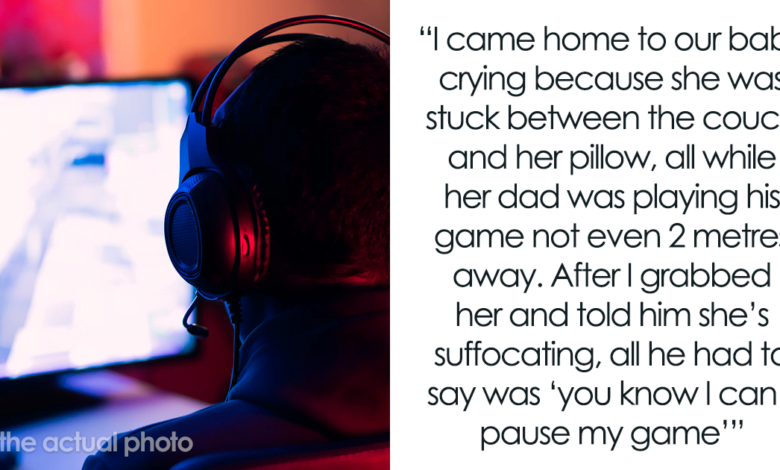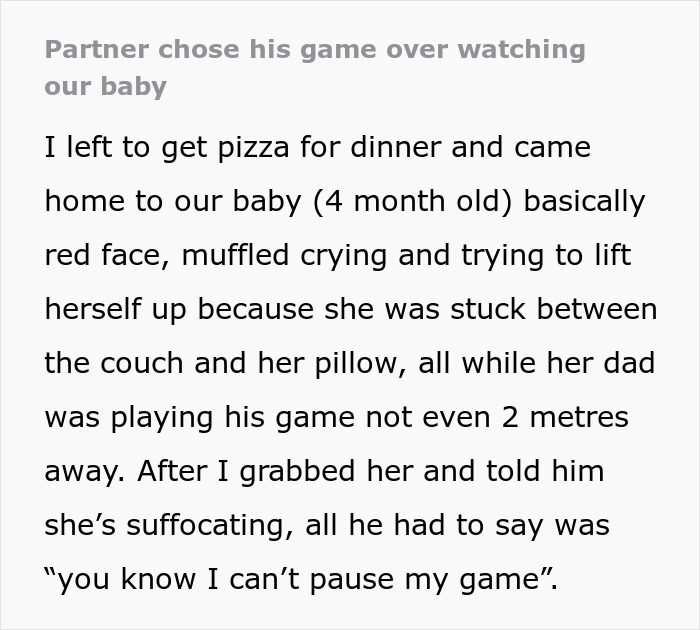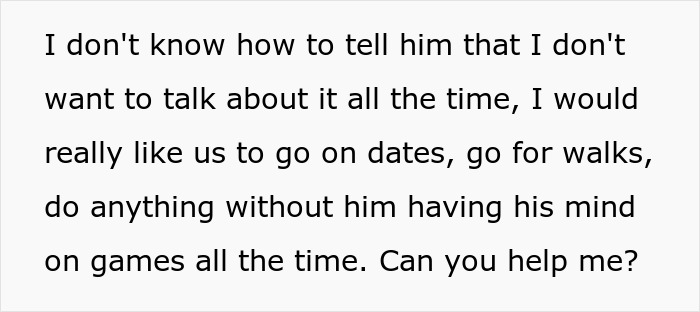People Share Their Stories About How Damaging Their Partners’ Gaming Addiction Is

There can always be too much of a good thing. If you throw moderation out the window, you’re not only harming yourself but you’re also impacting the people closest to you. In our digital and technologically advanced world, internet, social media, and video game addiction are a fact of life.
Today, we’re featuring three powerful and honest stories from Reddit where people opened up about how their partners’ massive video gaming habits have affected them. Scroll down to read them and to see what advice the internet had to share.
Video game addiction can have massive negative effects on a person’s physical and mental health, as well as their social life
Image credits: Fausto Sandoval / Unsplash (not the actual photo)
One mom opened up about how her partner prioritized gaming over childcare
Image credits: ResolutionGreat8923
Another person opened up about how obsessed her boyfriend can get when it comes to video games
Image credits: Soumil Kumar / Pexels (not the actual photo)
Image credits: Acrobatic-Bus-9911
Meanwhile, another internet user detailed how gaming has become a core part of her partner’s identity
Image credits: Anton Porsche / Pexels (not the actual photo)
Image credits: rogwithnoname
Gaming is incredibly widespread in this day and age
According to a recent study conducted by the Pew Research Center, 85% of teenagers living in the United States play video games. 41% of them do so every single day, and around the same number identify themselves as ‘gamers.’
There are lots of pros and cons associated with gaming, from making friends and getting good at solving various problems to losing sleep and getting harassed online.
72% of respondents revealed that they game to spend time with other people, while 47% admitted that they’ve made friends this way. However, 80% of American teens said that they believe harassment over video games is a problem that people their age deal with. 41% opened up that they’ve been insulted while playing online.
Video game addiction is also known as gaming disorder and has negative consequences on a person’s life because they’re unable to control their behavior. Their impaired control over gaming takes priority over other parts of their lives, harming their work, school performance, health, and personal relationships.
The World Health Organization has officially included gaming disorder in its 11th edition of the International Classification of Diseases.
People who suffer from gaming addiction can experience withdrawal symptoms. Among these are irritability or sadness when they stop playing. Meanwhile, they can also feel a greater need to play video games for longer. Some feel like they need to lie to others about how much they game. Meanwhile, others have failed at controlling their excessive gaming time.
However, Psychology Today notes that some experts are critical of gaming disorder diagnoses. From their perspective, it’s an indication that normal human behavior is being pathologized and treated for the sake of profit. From their point of view, it’s gaming passion, not addiction, that we should be talking about.
Some people are more likely than others to develop an obsession with activities that offer them escapism
People who are impulsive, have lower social skills, and a higher tolerance for violence may be at greater risk of video game addiction. Some other risk factors include having ADHD, depression, and anxiety.
The intention behind gaming matters, too. For instance, someone who plays video games for fun, to relax, or to connect with their friends may be less likely to become addicted than someone who wants to escape from their problems or to improve their status.
Gaming activates dopamine pathways. It’s what also happens when we do other pleasurable activities, though. Gaming can actually improve our minds. Say, for example, you like to play games that deal with a lot of spatial problems. Naturally, those regions of your brain that deal with spatial memory get activated, and they can grow over time. The same holds true for the parts of your brain related to visual acuity and attention.
If you can’t seem to stick to self-imposed time limits for gaming and you feel that your quality of life is suffering, then you need to take more serious steps to solve the problem. You can opt for a full or partial tech detox, exercise more, focus on other hobbies, or spend more time in nature or around family and friends. If things are really bad, you may want to get in touch with a therapist who specializes in addiction.
How much time do you spend gaming these days, dear Pandas? What’s the longest stretch of time that you’ve played video games for? Have you ever felt that you or a loved one has been addicted to gaming? How did that affect your lives? If you’re feeling up to it, share your thoughts in the comments.
Here’s how some internet users reacted to the viral stories they read
[ad_2]
Source link

























